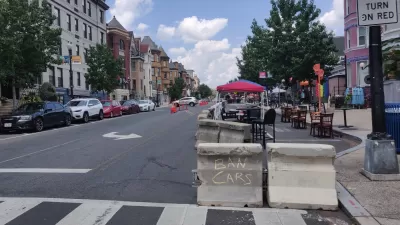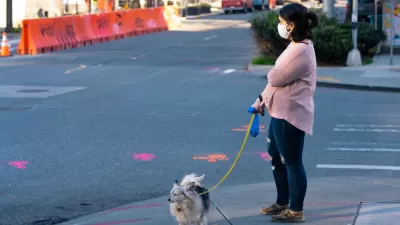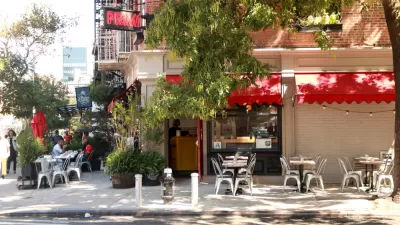The Oakland Slow Streets program, one of the most controversial developments of the early pandemic, has evolved to become the Essential Places initiative, thanks to new planning practices and a commitment to equity in Oakland, California.

Early pandemic, when stay-at-home orders were in place around much of the country and people leaving their cars in driveways in numbers not seen since the dawn of the automobile, the open streets movement began to gain transformative momentum as a way for weary residents to get out and safely exercise.
Oakland, California was one of the early leaders in the effort, announcing 74 miles of slow streets in April—weeks and even months before the idea would gain wide acceptance around the country. As the first, and with its history of gentrification and displacement, Oakland was also one of the first to hear criticisms that would become more vocal as the idea spread to other cities: that open streets and other programs suffered from a misunderstanding of equity and the realities of being people of color in public.
An article by Rikha Sharma Rani picks up the story in Oakland six months later to detail how planners have shifted their pandemic response to provide more equitable benefits. The article focuses on the city's deployment of the Essential Places initiative, launched in May "to reduce the threat to pedestrians in these high-injury corridors, many of them located in low-income communities of color," according to the article. "The initiative consists of an assortment of cones, barricades and signage strategically placed to slow or divert traffic."
Rikha Sharma Rani describes the Essential Places initiative as a replacement for the city's Open Streets program from April. The earlier program revealed a blindspot in the city’s planning, according to Rikha Sharma Rani: "At a time when urban planners are increasingly being called out for white elitism, Oakland is feeling its way, clumsily at times, down a different, more equitable path."
The transformation of the Slow Streets initiative into the more equitable Essential Places initiative involved weekly public meetings conducted by the city's Essential Places team, led by Warren Logan. The process of earning public trust during that process, and implementing the lessons gained along the way, is available in feature-length detail in the source article.
To be clear, the effort is framed as a success, and as a model for a more equitable approach to planning:
Perhaps not surprisingly, the pivot from slow streets to essential places in distressed neighborhoods, in direct response to the community’s feedback, has been generally well received. According to Department of Transportation data, there have been no collisions at designated Essential Places sites, even though all are part of the city’s high injury network where most collisions occur.
FULL STORY: How Oakland Got Real About Equitable Urban Planning

Maui's Vacation Rental Debate Turns Ugly
Verbal attacks, misinformation campaigns and fistfights plague a high-stakes debate to convert thousands of vacation rentals into long-term housing.

Planetizen Federal Action Tracker
A weekly monitor of how Trump’s orders and actions are impacting planners and planning in America.

In Urban Planning, AI Prompting Could be the New Design Thinking
Creativity has long been key to great urban design. What if we see AI as our new creative partner?

Baker Creek Pavilion: Blending Nature and Architecture in Knoxville
Knoxville’s urban wilderness planning initiative unveils the "Baker Creek Pavilion" to increase the city's access to green spaces.

Pedestrian Deaths Drop, Remain Twice as High as in 2009
Fatalities declined by 4 percent in 2024, but the U.S. is still nowhere close to ‘Vision Zero.’

King County Supportive Housing Program Offers Hope for Unhoused Residents
The county is taking a ‘Housing First’ approach that prioritizes getting people into housing, then offering wraparound supportive services.
Urban Design for Planners 1: Software Tools
This six-course series explores essential urban design concepts using open source software and equips planners with the tools they need to participate fully in the urban design process.
Planning for Universal Design
Learn the tools for implementing Universal Design in planning regulations.
planning NEXT
Appalachian Highlands Housing Partners
Mpact (founded as Rail~Volution)
City of Camden Redevelopment Agency
City of Astoria
City of Portland
City of Laramie





























